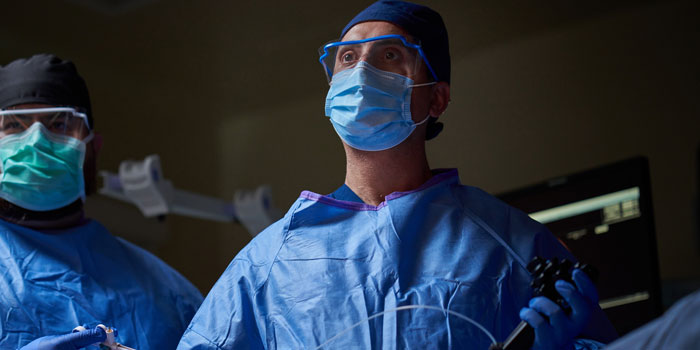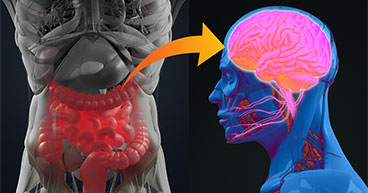
If you’re living with heartburn, you may eventually develop gastroesophageal reflux disease (GERD), a chronic form of acid reflux that sometimes requires medical treatment. Because this condition exposes your esophagus, throat and mouth to stomach acid, you likely have questions about the possibility of more serious risks, including a potentially pre-cancerous condition known as Barrett’s esophagus.
GERD is relatively common, affecting about one in five Americans, and it only rarely leads to a life-threatening type of cancer known as esophageal adenocarcinoma. Your doctor can help you monitor your condition and work with you to keep it under control.
But it’s important to understand the differences between occasional indigestion—from eating spicy foods or overdoing it with alcohol, for instance—and more serious forms of chronic GERD.
To help you understand more about the links between heartburn, GERD, Barrett’s esophagus and cancer, this article answers some common questions, including:
- What is acid reflux?
- What exactly is GERD?
- Does GERD increase your cancer risk?
- What is Barrett’s esophagus?
- Is Barrett’s esophagus cancer?
- What are the symptoms of Barrett’s?
- How do you know if Barrett’s is becoming cancer?
- How is Barrett’s treated?
- The Cancer Treatment Centers of America® (CTCA) Barrett’s Esophagus Treatment Program
If you’re interested in learning more about the diagnosis and treatment of GERD, Barrett’s esophagus, esophageal cancer or any gastrointestinal cancer and would like to speak with someone, call us or chat online with a member of our team.
What is acid reflux and why does it cause discomfort?
Gastroesophageal reflux (GER) is the technical term for the condition that causes heartburn. It happens when foods and beverages you’ve consumed mix with digestive acids from your stomach and back up into your esophagus.
In some people, GER causes only mild symptoms or even none at all. But many people with GER experience heartburn—a burning sensation in the middle of the chest, behind the breastbone.
When the condition causes vomiting, doctors sometimes refer to GER or acid reflux as acid indigestion or acid regurgitation.

What exactly is GERD?
Gastroesophageal reflux disease (GERD) is a more severe and long-lasting form of GER. It causes chronic symptoms, such as:
- Persistent heartburn
- Chest pain
- Nausea
- Problems swallowing
- Vomiting
- Loss of appetite
- Weight loss
- Chronic cough
- Hoarseness
These symptoms, which may occur even when you don’t eat or drink too much, may lead to serious complications over time, unless they’re managed with medication and changes in diet, weight and lifestyle habits.
GERD sometimes develops when the lower esophageal sphincter, which functions like a seal to keep stomach contents from backing up into the esophagus, becomes weak or relaxes when it shouldn’t.
You may be more likely to develop GERD if you’re overweight or obese, pregnant, smoke or take certain medications or dietary supplements that irritate the lining of your esophagus. These include:
- Antibiotics
- Painkillers
- Antidepressants
- Quinidine
- Bisphosphonates
- Statins
- High blood pressure drugs
- Progesterone
- Sedatives
- Iron
- Potassium pills
A hiatal hernia—in which the opening in the diaphragm allows the upper part of the stomach bulge into the chest—may also increase the risk of GERD or make symptoms worse. Some people with GERD also develop complications in the mouth, throat or lungs, including asthma, chronic cough, laryngitis and loss of tooth enamel.
It’s important to seek a doctor’s care if you suspect you have GERD and your symptoms don’t improve with over-the-counter heartburn medicines. Without treatment, GERD may lead to serious complications, such as esophagitis, esophageal stricture and Barrett’s esophagus, which may increase the risk of esophageal cancer.
Does GERD increase your cancer risk?
Although GERD isn’t directly linked to cancer, it may lead to a more serious condition called Barrett’s esophagus, which may raise your risk of developing esophageal adenocarcinoma.
Research has found people who have more frequent symptoms tend to have a higher risk. But GERD is very common, so it’s important to keep in mind that most people who have it don’t develop esophageal cancer, which is very rare—accounting for about 1 percent of all cancers diagnosed in the United States, according to the National Cancer Institute.
Even so, it’s a good idea to seek care to be sure your GERD doesn’t develop into Barrett’s esophagus.
What is Barrett’s esophagus?
Barrett's esophagus is a disorder that develops in the tissues lining the esophagus. Cells in the esophagus lining change to become more like cells in the lining of the intestines. In some with Barrett’s, precancerous cells replace these damaged tissues. According to the National Institutes of Health, up to 15 percent of people with GERD will develop Barrett’s.
Is Barrett’s esophagus cancer?
As I mention above, although Barrett’s esophagus isn’t cancer, it may lead to precancerous cellular changes in which cells in the lining of the esophagus begin to grow out of control.
Esophageal cancer may form and grow anywhere along the esophagus. It typically starts in the inner layer of the esophagus wall and then grows outward through other layers. Esophageal cancer is rare—affecting about one in 100 Americans, according to the American Cancer Society. Every year, about 20,640 new cases are diagnosed in the United States (16,510 in men and 4,130 in women), and the disease causes an estimated 16,410 deaths (13,250 in men and 3,160 in women).
In addition to GERD, certain factors may increase your risk of developing Barrett’s esophagus. Among them:
- Family history of the disease or esophageal cancer
- Tobacco use
- Alcohol use
- Obesity
- Unhealthy diet, including high-fat foods and carbonated or caffeinated beverages
White men over the age of 50 are also more likely than others to develop Barrett’s esophagus.
What are the symptoms of Barrett’s esophagus?
If you have Barrett’s esophagus, you may not know it because it often causes few or no symptoms. But people with Barrett’s often have the typical symptoms of GERD, including:
- Chronic heartburn
- Difficult or painful swallowing
- Nausea or vomiting
- Unexplained weight loss
- Persistent cough or sore throat
- Hoarseness
If you have these symptoms, it’s important to see a doctor with the training, skills and experience to screen for Barrett's esophagus and design an immediate care and treatment plan to keep it in check.

How do I know if my Barrett’s esophagus is becoming cancerous?
Like Barrett’s esophagus, esophageal cancer doesn’t usually cause symptoms in its early stages, so you may not even know you have it. But once the disease progresses, you may have difficulty swallowing—a condition known as dysphagia—because the opening to the esophagus contracts and becomes smaller. Other symptoms of esophageal cancer mirror typical signs of GERD.
Esophageal cancer may be detected with several tests, imaging and endoscopic exams, including:
- Endoscopic procedures to examine the lining of the upper digestive tract, sometimes performed with ultrasound or other imaging tests to obtain pictures of the esophagus, stomach and intestines
- Biopsies to examine tissues for abnormal growth
How is Barrett’s esophagus treated?
Conventional treatment for Barrett’s esophagus involves medicines, ablation therapies (to destroy abnormal cells) and surgery. Your doctor may also periodically use upper GI endoscopy and biopsies to track and monitor your condition and check for signs of cancer.
Treatment options for Barrett’s include:
Medicines: Acid-suppressing medicines such as proton pump inhibitors (PPIs) may prevent further damage and, in some cases, even heal the lining of the esophagus. These include omeprazole (Prilosec®), lansoprazole (Prevacid®) and esomeprazole (Nexium®), all available by prescription. Omeprazole and lansoprazole are also available in over-the-counter versions.
Endoscopic ablation therapies: If medicines don’t work, your doctor may recommend anti-reflux therapies that use techniques to destroy the abnormal cells in the esophagus and allow the body to begin making normal esophageal cells again. These include:
- Photodynamic therapy, which uses a light-activated chemical, an endoscope and a laser to kill precancerous cells in the esophagus
- Radiofrequency ablation, which uses radio waves to kill precancerous and cancerous cells in the Barrett’s tissue
Cryotherapy: This procedure is similar to radiofrequency ablation but uses extreme cold (liquid nitrogen) rather than heat to destroy tissue.
Endoscopic mucosal resection: For this surgical procedure, the doctor lifts the Barrett’s tissue in the esophagus, injects a solution underneath it or applies suction to it, then cuts the abnormal tissue away.
Esophagectomy: Your doctor may also recommend an esophagectomy, the surgical removal of abnormal sections of the esophagus and reconstruction of those areas using part of the stomach or large intestine. This surgery is more invasive than other options and typically requires a seven- to 14-day hospital stay after the operation to recover.
The CTCA Barrett’s Esophagus Treatment Program
If you have GERD and are concerned it may progress to Barrett’s esophagus or cancer, it may seem overwhelming to assess your options and choice. At CTCA, our team of experts will work with you to help you make educated decisions about your care.
The Barrett’s Esophagus Treatment Program at CTCA is dedicated to screening, diagnosing, treating and caring for people with Barrett’s esophagus. Because no two patients are the same, our patient-centered approach recognizes each patient’s needs require individualized care, treatment and management.
This unique, patient-centered approach allows our gastroenterology team to provide comprehensive care to treat Barrett's esophagus and help prevent esophageal cancer, while relieving your symptoms and helping you avoid complications and maintain your quality of life.
Key components of the Barrett’s Esophagus Treatment Program at CTCA include:
Screening for Barrett’s esophagus: If you have chronic heartburn, GERD and other risk factors, our team of cancer experts will determine if you have Barrett’s esophagus. We’ll also recommend screening for Barrett’s esophagus if you have chronic symptoms of GERD (at least once a week for five years or more) and two or more additional risk factors for Barrett’s esophagus (such as being obese, using tobacco and being over age 50).
Diagnosing Barrett's esophagus: To diagnose the condition, a CTCA expert will meet with you to discuss:
- The severity and frequency of your symptoms, such as heartburn or difficulty swallowing
- Your medical history and lifestyle, as well as your family’s medical history
- The possibility of performing an upper endoscopy or a biopsy, which takes a small sample of esophageal tissue so an expert can examine the cells under a microscope, if you’re at risk for Barrett’s

If your CTCA care team diagnoses Barrett’s esophagus, the next step is to measure how much of the lining is affected to determine the severity of your condition. The esophagus is typically 10 to 13 inches long. Short-segment Barrett’s esophagus affects less than 1.2 inches of the lining, while a long-segment Barrett’s esophagus diagnosis refers to anything more than that. The longer the segment, the more likely that Barrett’s may develop into esophageal cancer. Our team will consider the length of the Barrett’s segment in developing a plan to monitor and treat the condition.
Barrett's esophagus monitoring: If you’ve been diagnosed with Barrett’s esophagus, your doctor will monitor the condition to detect cellular changes that may indicate cancer as early as possible. Your CTCA team will work with you develop a personalized monitoring schedule based on your needs, risk factors and diagnosis.
State-of-the-art techniques will be used to sample esophageal tissue at regular intervals, using evidence-based methods to catch cancer early, when more options may be available to treat it.
Unlike traditional biopsy techniques, which may miss areas with abnormal cells, our WATS3D (wide-area transepithelial sampling in three dimensions) next-generation system is designed to sample a wider area of the esophagus. This advanced technique uses artificial intelligence to detect precancerous cells that may be missed with traditional methods.
Only a small percentage of people with Barrett’s esophagus develop esophageal cancer, but catching it early may mean more treatment options, less invasive therapies and better outcomes.
Treatment for Barrett’s esophagus: CTCA provides wrap-around care for people with Barrett’s—offering support for healthy lifestyle changes, medications and minimally invasive procedures to treat Barrett’s, ease symptoms and remove precancerous cells. Key components include:
- Medications: If Barrett’s esophagus causes you pain or affects your ability to swallow, the experts at CTCA may prescribe antacids to neutralize stomach acid or PPIs and H2 blockers to reduce acid production in the stomach.
- Minimally invasive procedures: If your condition is not responding to medication or is progressing, our experts treat portions of affected esophageal lining with advanced, minimally invasive procedures, such as radiofrequency ablation, endoscopic mucosal resection and cryotherapy.
- Pain management and recovery: To keep you comfortable during any Barrett’s procedure, we’ll provide intravenous sedation and may also use endoscopic ultrasound to take images inside the esophagus to help guide the procedure and treatment plan.
In designing a treatment, our experts will work closely with you so you can make informed decisions about your treatment plan. Together, we’ll consider:
- How advanced your condition is
- How much the symptoms affect your quality of life
- Which side effects and risks you need to know about
- What your preferences and treatment goals are
In the rare case that your Barrett’s esophagus progresses to esophageal cancer, being a part of the CTCA care program offers you immediate access to a trained and experienced multidisciplinary team of gastroenterologists, medical oncologists, surgical oncologists and radiation oncologists, all collaborating under one roof to offer personalized cancer care treatment options like chemotherapy, radiation therapy and surgery.
No matter where you get your care, it’s important to recognize the potential risks posed by chronic GERD and Barrett’s esophagus, and to see oncology-trained experts to monitor your condition and, if possible, help you lower your risk of cancer.
If you’re interested in learning more about the diagnosis and treatment of GERD, Barrett’s esophagus, esophageal cancer or any gastrointestinal cancer and would just like to speak with someone, call us or chat online with a member of our team.



